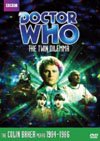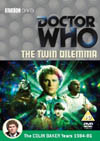DVD Extras include:
Colin Baker himself performs well as the Doctor, bringing a lot of energy, enthusiasm, and a commanding presence to the show. The biggest drawback of his era turns out to be chiefly in the writing, as obvious traps and no-no's were wallowed in and celebrated, not least of which was a gross mishandling of the Doctor's character arc. As Colin himself apparently had a hand in the planning of this, perhaps he shouldn't be immune from the criticism. I've read that they intentionally made Colin's Doctor antagonistic at first, planning to gradually shift to more likeable traits as he continued. Well, at least the likeable parts eventually worked. By the time we got to "The Trial of a Time Lord" (season twenty-three), I was completely behind Colin's Doctor, but half the audience had been alienated and was no longer watching. Indeed, this was no longer the show you could proudly encourage your friends to watch, because it now seemed to insist on putting out horrendous embarrassments beside its excellence at any given moment.
Poisonous Story-Padding"The Twin Dilemma" itself is developed from a decent storyline that should have produced a solid, average Doctor Who adventure. However, the development is quite thin, leaving ample room to be padded by too much subplot concerning the new Doctor's off-colour character traits. Regeneration troubles are always a bad idea hindering any new Doctor's debut, and here the plans seem to include stretching these problems out over a multi-story arc. No. No. No! And this tale doesn't actually stop at making the new Doctor look bad. In attempts to justify himself with a contrast, he winds up launching a bit of a verbal attack of the previous Doctor, trying to frame Peter Davison's portrayal as passive, amongst other things. If you limit your remembrance of Davison to the violent action-fests of "Resurrection of the Daleks" (story no. 134) and "The Caves of Androzani" (story no. 136) which many fans still drool over, you might even believe the new Doctor has a point. Sorry, but a good examination of Davison's best, which include "Frontios" (story no. 133), "Enlightenment" (story no. 128), "Snakedance" (story no. 125), and "Earthshock" (story no. 122), and you'll know that Colin is just blowing smoke up his own clown-coat and falling victim to the passive-aggressive syndrome trap that script editor Eric Saward has laid out for him, and for too many of the other characters that he will meet on his travels. And the aggressive side comes out in full force here. Peri's comment that "We all have to repress our feelings from time to time" is such a focus on the wrong part of the dynamic. How about learning to generate better feelings in the first place, as a habit? Learn to interpret the world without blame. Focus on contributing to others and helping them move towards their dreams. And have a jelly baby while you're at it.As this story proceeds though, it isn't just the Doctor and Peri's subplot that suffers. Everyone's dialogue descends into a sort of juvenile posturing that makes even this half-decent plot painful to follow. It's just plain badly written. Give the same story to a writer who can celebrate character with wittier and more pleasant dialogue, and you may easily end up with something decent. All is not bad though. This story does manage to deliver a LOT of good and very moving moments. I think an editor with a skilled knife could easily cut out scads of the bad material, which is almost always argumentative padding that stopped the story in its tracks, and wind up with something far pacier and more tasteful. In such a form, "The Twin Dilemma" could easily begin to rise in the ranks of season twenty-one and become half-decent and enjoyable. And because of all these redeeming bits, I don't think the story deserves the dismissal most fans seem to treat the tale to. It would probably tend to look like something out of the Graham Williams era, strong on alien settings and bright colourful eye-candy, and messing with astrophysics for major story concepts, yet still winding up a bit on the goofy side. Granted this doesn't please all fans or all viewers, but I could go for it. This story is easily the least effective piece of work that director Peter Moffatt did for the show. So many acting moments that neither turn out well nor move the story forward should have been on the cutting room floor, while a lot of otherwise staple elements of a Doctor Who story were either not included in the script or not filmed/taped. Perhaps the most obvious missing element is the regeneration itself. Part One would work so much better for new viewers if it had begun by repeating the concluding moments of "The Caves of Androzani" (story no. 136), as a set-up for what happens here, and there is more than enough junk and rubbish that could be dropped to make time for it. That said, I do like Colin's first couple of scenes enormously. He seems very "Doctorish", and we get a better explanation of regeneration here than anywhere else in Doctor Who ever. Then his mood swings begin, and his remaining scenes in the TARDIS begin to tank in quality.
Get me to the asteroid on time....Scenes amongst the guest cast work fairly well in this first episode, though there are probably too many of them happening prior to the Doctor and Peri's involvement. This becomes a running theme throughout the next season: Can the Doctor and Peri even manage to arrive amongst the guest cast within the first 23 minutes of any story? Although we'll grant the Doctor some extra time in this tale, since he has to pick his new costume and all, both the script and the director really don't do justice to the concept of exploration of the Titan Three asteroid / planet(oid). On the TARDIS scanner screen, it looks like an airless moon, or night-time at the very least. During the Doctor and Peri's far too minimal scenes outside the TARDIS, it looks like your everyday fresh-air quarry in fairly bright daylight. Obviously, less time should have been spent examining the Doctor's navel, and more time on defining the location exploratively and atmospherically. A good police box materialization would have helped. Wider angles establishing geography and the crashed ship would have helped. This habit of ignoring proper exploration of the elements of the external "A" plot and instead focusing on how the Doctor's self-centeredness can stop the plot dead at any time was the biggest drawback of the tale.Even the labeling of Titan Three is problematic. It's easy to fall into the trap of thinking that this is Saturn's most famous moon that they have landed on. Should it then look like the airless sandy red desert seen in the original version of "The Invisible Enemy" (story no. 93), or should it look like the more "astronomically correct" version seen in the CGI upgrades, with a thick yellowy gaseous atmosphere, both of which were unbreathable for Humans and Gallifreyans? Well, probably neither, since "Titan Three" indicates that Titan is in this case the name of the sun of this solar system, and Titan Three is the third planet out. A better, more unique star name is probably called for. Ltn. Hugo Lang also turns out to be a bizarre character. The script really seems to go out of its way to avoid having people talk to him when they most need to. He always seems to be flopping over, rendering himself unconscious, or otherwise getting stuck and left behind somehow. It's also hard to imagine him as an officer of the law, since he seems so idiotically keen to kill people instead of arresting them or questioning them to further his investigation of the twins' disappearance. Thus Eric Saward actually has a mercenary on his hands instead, which he probably preferred, although this isn't a very inspiring one.
Orbit-uaryAlthough the astrophysics crucial to this story's plot are a welcome element, this element is never really dealt with well. After the confusion surrounding the labeling of "Titan Three", we get a bit about mathematically calculating a new stability for combining the orbits of three planets in the Jaconda system. Just quickly visualizing that in my head necessitated that Jaconda itself would be in a new orbit further out from its sun. Or, even if it could just speed up its present orbit, it would be wobbling within it much more thanks to additional gravitational pull from the other two planetoids. Either way, it would likely not be able to maintain the same climate and ecosystem, and it's hard to imagine that the other two planetoids would adopt Jaconda's climate just from being at the same approximate distance from its sun. That threatens the whole point of the exercise, from Edgeworth and the Jacondan's point of view. How much terraforming were they planning to do? Anyway, episode four's revelations concerning this plan hardly seem surprising, and it is a real stretch to believe that so many people worked on the plan for so long, making the daft assumptions that they do about what the new configuration would look like, without finding far more things wrong with it than the ones that are later revealed.
A Badge for Musical ExcellenceIf there is one truly outstanding element in this story, it is the wonderful music of Malcolm Clarke, as he lives up to his usual high standard, this time without a big blockbuster story for it to sit alongside. Yes, there are a few cringeful bits like the one backing Peri's costume selection, and a few obvious borrowed bits from "Resurrection of the Daleks" (story no. 134), but Clarke really attempts to provide a lot musically, and most of it is exceptionally good. Similar instrumentation to what he used in "Resurrection" is utilized again to back this story's tense scenes, particularly regarding Noma and the Jacondan spaceship seen in the story. But most of the truly moving moments have brand new excellent music behind them from Clarke. My favourite elements of this score include the elegantly beautiful "Equations" theme used often whenever the twins are hard at work, a glorious introductory cue for Jaconda used twice in episode three, and the backing for the final moments of Edgeworth's last scene. Super stuff. I'd have eagerly bought the DVD release solely on the strength of getting the isolated music score, knowing I'd be listening to most of it over and over again, but sadly this is one of the few stories from the 1980's that doesn't include one. The BBC lost a sale there.
International Titles:Deutsch (German): "Zweimal Einstein"Magyar (Hungarian): "A kettős dilemma"Français (French): (Le Double Dilemme)Русский (Russian): "Дилемма близнецов"All Colin Baker stories were dubbed into German and broadcast on the VOX channel beginning in February 1995. So, yes, these are the German titles as they went out on German TV...Well, the Russians seem to understand that we'll find a pair of twin brothers at the heart of this story's action, while the Hungarians and the French seem to imply that it's more about either a double-size dilemma, or a problem of someone encountering a duplicate of themselves. The Germans really went another way, implying the twins' extreme mathematical intelligence by referring to them as "Einstein, twice over".
This story has become available on DVD and VHS video. Click on the Amazon symbol for the location nearest you for pricing and availability:
Comments on this article are welcome. You may contact the author from this page:
|








